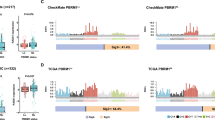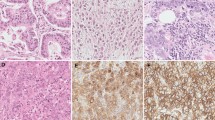Abstract
Background
Recent studies have shown that somatic mutations in the AT-rich interactive domain 1A (SWI-like) gene (ARID1A) are the most common genetic changes in clear cell carcinoma of the ovary (CCC). A gene mutation of ARID1A was found in approximately half of CCC cases, and led to absence of the encoded protein and inactivation of the putative tumor suppressor. Here, we investigated whether ARID1A could be a prognostic biomarker for this disease.
Methods
We analyzed the protein expression of ARID1A in CCC from 112 patients by immunohistochemical staining, and evaluated the association of these molecular parameters with clinical outcome.
Results
The loss of ARID1A expression was found in 39 % (44/112) of CCC, and was not associated with patient age, FIGO stage, and status of residual tumor. The 5-year survival rate for FIGO stage I or II patients with negative tumor expression of ARID1A was lower than those with positive tumor expression of ARID1A (74 % vs 91 %), but this difference was not observed in FIGO stage III or IV patients. Multivariable analysis revealed that ARID1A expression was an independent prognostic factor in FIGO stage I or II CCC patients.
Conclusion
ARID1A may be a biomarker that is predictive of the outcome of FIGO stage I and II CCC.


Similar content being viewed by others
References
Scully RE (1975) World Health Organization classification and nomenclature of ovarian cancer. Natl Cancer Inst Monogr 42:5–7
Itamochi H, Kigawa J, Terakawa N (2008) Mechanisms of chemoresistance and poor prognosis in ovarian clear cell carcinoma. Cancer Sci 99:653–658
Fukunaga M, Nomura K, Ishikawa E et al (1997) Ovarian atypical endometriosis: its close association with malignant epithelial tumours. Histopathology 30:249–255
Jones S, Wang TL, Shih Ie M et al (2010) Frequent mutations of chromatin remodeling gene ARID1A in ovarian clear cell carcinoma. Science 330:228–231
Wiegand KC, Shah SP, Al-Agha OM et al (2010) ARID1A mutations in endometriosis-associated ovarian carcinomas. N Engl J Med 363:1532–1543
Ho L, Crabtree GR (2010) Chromatin remodelling during development. Nature 463:474–484
Huang J, Zhao YL, Li Y et al (2007) Genomic and functional evidence for an ARID1A tumor suppressor role. Genes Chromosomes Cancer 46:745–750
Ayhan A, Mao TL, Seckin T et al (2012) Loss of ARID1A expression is an early molecular event in tumor progression from ovarian endometriotic cyst to clear cell and endometrioid carcinoma. Int J Gynecol Cancer 22:1310–1315
Samartzis EP, Samartzis N, Noske A et al (2012) Loss of ARID1A/BAF250a-expression in endometriosis: a biomarker for risk of carcinogenic transformation? Mod Pathol 25:885–892
Mao TL, Ardighieri L, Ayhan A et al (2013) Loss of ARID1A expression correlates with stages of tumor progression in uterine endometrioid carcinoma. Am J Surg Pathol 37:1342–1348
Maeda D, Mao TL, Fukayama M et al (2010) Clinicopathological significance of loss of ARID1A immunoreactivity in ovarian clear cell carcinoma. Int J Mol Sci 11:5120–5128
Guan B, Mao TL, Panuganti PK et al (2011) Mutation and loss of expression of ARID1A in uterine low-grade endometrioid carcinoma. Am J Surg Pathol 35:625–632
Huang HN, Lin MC, Huang WC et al (2014) Loss of ARID1A expression and its relationship with PI3K–Akt pathway alterations and ZNF217 amplification in ovarian clear cell carcinoma. Mod Pathol 27:983–990
Katagiri A, Nakayama K, Rahman MT et al (2012) Loss of ARID1A expression is related to shorter progression-free survival and chemoresistance in ovarian clear cell carcinoma. Mod Pathol 25:282–288
Lai CR, Hsu CY, Chen YJ et al (2013) Ovarian cancers arising from endometriosis: a microenvironmental biomarker study including ER, HNF1ss, p53, PTEN, BAF250a, and COX-2. J Chin Med Assoc 76:629–634
Lowery WJ, Schildkraut JM, Akushevich L et al (2012) Loss of ARID1A-associated protein expression is a frequent event in clear cell and endometrioid ovarian cancers. Int J Gynecol Cancer 22:9–14
McConechy MK, Ding J, Senz J et al (2014) Ovarian and endometrial endometrioid carcinomas have distinct CTNNB1 and PTEN mutation profiles. Mod Pathol 27:128–134
Wiegand KC, Hennessy BT, Leung S et al (2014) A functional proteogenomic analysis of endometrioid and clear cell carcinomas using reverse phase protein array and mutation analysis: protein expression is histotype-specific and loss of ARID1A/BAF250a is associated with AKT phosphorylation. BMC Cancer 14:120
Wu RC, Ayhan A, Maeda D et al (2014) Frequent somatic mutations of the telomerase reverse transcriptase promoter in ovarian clear cell carcinoma but not in other major types of gynaecological malignancy. J Pathol 232:473–481
Xiao W, Awadallah A, Xin W (2012) Loss of ARID1A/BAF250a expression in ovarian endometriosis and clear cell carcinoma. Int J Clin Exp Pathol 5:642–650
Yamamoto S, Tsuda H, Takano M et al (2012) PIK3CA mutations and loss of ARID1A protein expression are early events in the development of cystic ovarian clear cell adenocarcinoma. Virchows Arch 460:77–87
Wilson BG, Roberts CW (2011) SWI/SNF nucleosome remodellers and cancer. Nat Rev Cancer 11:481–492
Yokoyama Y, Matsushita Y, Shigeto T et al (2014) Decreased ARID1A expression is correlated with chemoresistance in epithelial ovarian cancer. J Gynecol Oncol 25:58–63
Wang DD, Chen YB, Pan K et al (2012) Decreased expression of the ARID1A gene is associated with poor prognosis in primary gastric cancer. PLoS One 7:e40364
Cho H, Kim JS, Chung H et al (2013) Loss of ARID1A/BAF250a expression is linked to tumor progression and adverse prognosis in cervical cancer. Hum Pathol 44:1365–1374
Fadare O, Renshaw IL, Liang SX (2012) Does the loss of ARID1A (BAF-250a) expression in endometrial clear cell carcinomas have any clinicopathologic significance? A pilot assessment. J Cancer 3:129–136
Lichner Z, Scorilas A, White NM et al (2013) The chromatin remodeling gene ARID1A is a new prognostic marker in clear cell renal cell carcinoma. Am J Pathol 182:1163–1170
Yan HB, Wang XF, Zhang Q et al (2014) Reduced expression of the chromatin remodeling gene ARID1A enhances gastric cancer cell migration and invasion via downregulation of E-cadherin transcription. Carcinogenesis 35:867–876
Kuo KT, Mao TL, Jones S et al (2009) Frequent activating mutations of PIK3CA in ovarian clear cell carcinoma. Am J Pathol 174:1597–1601
Vivanco I, Sawyers CL (2002) The phosphatidylinositol 3-kinase AKT pathway in human cancer. Nat Rev Cancer 2:489–501
Okamoto A, Glasspool RM, Mabuchi S et al (2014) Gynecologic Cancer InterGroup (GCIG) consensus review for clear cell carcinoma of the ovary. Int J Gynecol Cancer 24:S20–S25
Zang ZJ, Cutcutache I, Poon SL et al (2012) Exome sequencing of gastric adenocarcinoma identifies recurrent somatic mutations in cell adhesion and chromatin remodeling genes. Nat Genet 44:570–574
Bosse T, ter Haar NT, Seeber LM et al (2013) Loss of ARID1A expression and its relationship with PI3K–Akt pathway alterations, TP53 and microsatellite instability in endometrial cancer. Mod Pathol 26:1525–1535
Liang H, Cheung LW, Li J et al (2012) Whole-exome sequencing combined with functional genomics reveals novel candidate driver cancer genes in endometrial cancer. Genome Res 22:2120–2129
Samartzis EP, Gutsche K, Dedes KJ et al (2014) Loss of ARID1A expression sensitizes cancer cells to PI3K- and AKT-inhibition. Oncotarget 5:5295–5303
Acknowledgments
This work was supported by a Grant-in-Aid for Scientific Research from the Ministry of Education, Culture, Sports, Science and Technology of Japan (17244120 to H. Itamochi).
Conflict of interest
The authors declare that they have no conflict of interest.
Author information
Authors and Affiliations
Corresponding author
About this article
Cite this article
Itamochi, H., Oumi, N., Oishi, T. et al. Loss of ARID1A expression is associated with poor prognosis in patients with stage I/II clear cell carcinoma of the ovary. Int J Clin Oncol 20, 967–973 (2015). https://doi.org/10.1007/s10147-015-0811-x
Received:
Accepted:
Published:
Issue Date:
DOI: https://doi.org/10.1007/s10147-015-0811-x




